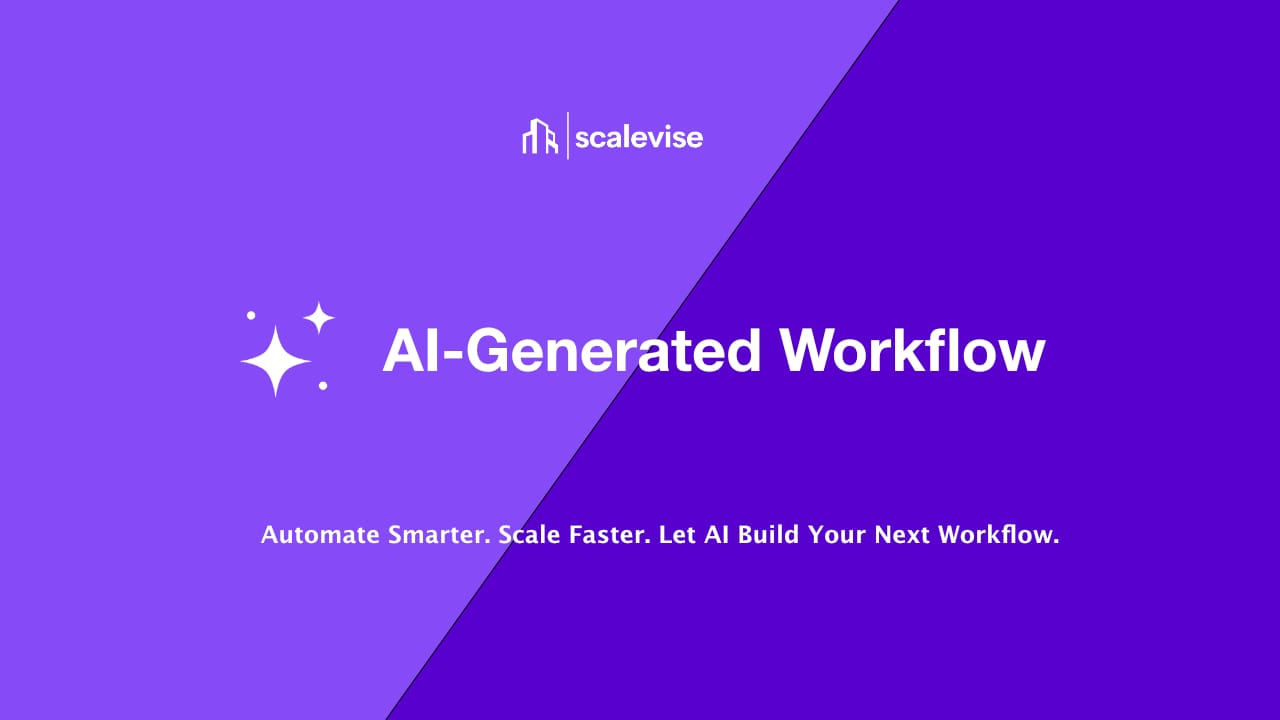What Is an AI-Generated Workflow And How to Use It in Your Business

AI-generated workflows are the next evolution in business automation. Instead of manually designing a flowchart or writing scripts, you're simply describing what you want in natural language — and the AI builds the logic, suggests the tools, and even connects the APIs for you.
But what exactly is an AI-generated workflow? And how can real businesses use this to save time, scale operations, and reduce manual tasks? Let’s dive in.
What Is an AI-Generated Workflow?
An AI-generated workflow is an automated process created by an artificial intelligence system based on a user’s input, goals, or natural language description. The AI:
- Understands your objective
- Designs the logic or decision tree
- Chooses tools or APIs
- Generates the automation setup
This can happen inside tools like Make.com, Zapier, n8n, or within custom AI agents.
Learn more in our AI & Automation Overview.
How It Works
- Input Your Use Case
Example: “When a lead fills out my website form, add them to Pipedrive, send a Slack alert, and generate a custom proposal.” - AI Parses and Designs the Logic
It identifies triggers, actions, conditions, and integrations needed. - Tools Are Auto-Suggested
AI recommends the best tools based on your stack — HubSpot, Gmail, Notion, Stripe, etc. - Workflow Is Built
The AI connects the tools, writes the API calls, adds filters or conditions, and deploys a test run.
Real Use Cases for AI-Generated Workflows
1. Lead Qualification Automation
Input: “Score my leads based on company size and industry, then send hot leads to my sales team.”
AI builds a flow using your CRM, an enrichment tool, and email/SMS notification.
👉 See our AI Agent for Lead Qualification.
2. Client Onboarding
Input: “Send new clients a welcome package, assign tasks to our team, and create a shared folder.”
AI integrates your project management, document, and communication tools automatically.
3. HR Process Automation
Input: “When someone applies, add them to our HR database, notify HR, and schedule a screening.”
AI builds the complete hiring funnel within minutes.
👉 Learn more about HR Automation with AI
4. Customer Support Routing
Input: “Automatically route technical questions to tech team, and billing issues to finance.”
AI detects keywords and routes conversations based on logic.
Benefits for Any Business
- Speed: Build in minutes what used to take hours or days
- Non-technical: Anyone can describe what they want; no dev needed
- Scalability: You can duplicate, adapt, or expand AI-generated workflows across teams or regions
- Cost Reduction: Cut down on operational and engineering costs significantly
Limitations to Watch For
- Over-reliance on default logic — AI can guess wrong without clear inputs
- Tool integration gaps — Some APIs may need manual intervention
- Compliance & Security — You still need to verify how data is processed and stored
Smart businesses treat AI-generated workflows as first drafts, not final solutions.
How Scalevise Implements AI Workflows
At Scalevise, we build AI-powered systems for automation, sales, HR, marketing, and support — combining:
- Custom GPT agents
- No-code tools like Make or n8n
- Integrations with your CRM, ERP, or internal tools
We help businesses:
- Define their goal in natural language
- Let AI design the automation
- Review and harden the flow
- Launch it within hours, not weeks
Explore more use cases on Scalevise Resources
Final Thought
The real power of AI in automation isn't just saving time. It’s making every department smarter, leaner, and more agile — without rewriting code or hiring more staff.
Looking to build your first AI-generated workflow? Start with one use case. Let the AI build the draft. Then scale from there.
Visit https://scalevise.com/resources for practical examples and client stories.
